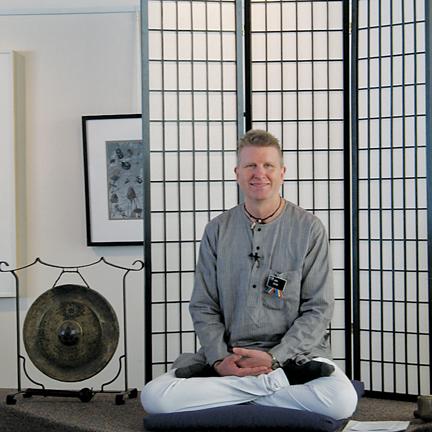ISU instructors find peace through meditation

Joel Geske poses during a Sunday meditation program at the Unitarian Universalist Fellowship of Ames.
February 21, 2011
As ISU faculty members know, the life of a career academic is filled with stress. Juggling research, grading and teaching taxes the emotional reserves of scholars at every level, from adjunct to department chairperson. At times, the pressures of their jobs can seem inescapable.
But for two ISU instructors, this is not the case. Brian Eslinger and Joel Geske said they find relief from the stress of work in the Buddhist traditions of mindfulness meditation.
Historically, the term “meditation” has been used to refer to many different practices within Buddhism, including breath-counting, repetition of a word or phrase known as a mantra and the contemplation of paradoxical questions called koans. Broadly speaking, the aim of meditation is to attain enlightenment — a state of total freedom from suffering and desire.
Eslinger, a lecturer of philosophy and religious studies, learned about Buddhism from the works of the Japanese author D.T. Suzuki. At least four times a week, he sits and counts his breath — usually for a period of 20 minutes. He credits the practice with improving his self-awareness, listening skills and sense of well-being.
“Meditation helps me … to be more centered and be more intentional about how I am in the rest of my life,” Eslinger said.
Eslinger, an ordained Unitarian Universalist minister, has been meditating since 1989, basing his practice on teachings from the Soto sect of Zen Buddhism. He finds himself applying the self-insight won through years of meditation both in the classroom and at home.
He believes meditation has helped him respond more acutely to his students’ questions. He also thinks it’s made him less rigid and slower to anger when he and his son have disagreements.
“That’s one of the things about meditation practice,” Eslinger said. “It’s much more about the time when you aren’t meditating than the time when you are meditating.”
Geske, associate professor of journalism and communication, has been meditating for the past 15 years. He was introduced to Buddhist meditation in a world religions class he took as an undergraduate at Iowa State.
Geske was raised as a Missouri Synod Lutheran but felt no real connection to his faith. He said Buddhism interested him because, unlike his family’s religion, it had no “external force controlling the universe” in the manner of the Christian God. Its emphasis, he surmised, was on “looking within you, to find out where your demons are.”
“You learn a lot about yourself and acceptance of the world as it is. And then, when you get that acceptance, you find an awful lot of peace,” Geske said.
Geske meditates at least once a day, with individual sessions lasting between half an hour and an hour. He said he often uses a mantra inspired by the Vietnamese monk Thich Nhat Hanh. To perform it, he thinks of the word “peace” while inhaling and smiles upon exhaling.
Like Eslinger, Geske believes that meditation should be viewed as a way of life rather than an obscure religious ritual.
“There’s a misperception that you have to become a recluse to meditate,” Geske said. “Really, everything you do during the day can be a source of meditation and mindfulness.”
Far from being recluses themselves, Eslinger and Geske founded a meditation group in 2006. Holding meetings at the Unitarian Universalist Fellowship of Ames — where Eslinger was a pastor — the two co-led meetings until last year. Changes in Geske’s schedule and Eslinger’s desire to teach full-time led both men to cut their ties with the Fellowship group.
The two no longer attend the groups’ meetings, but it has survived their departure. The participation of other ISU faculty members, such as associate professor of English Barbara Haas and Nancy Grudens-Schuck, associate professor of agriculture, has kept it alive. The group still meets from 6 to 7 p.m. every Sunday at the Unitarian Universalist Fellowship of Ames.






